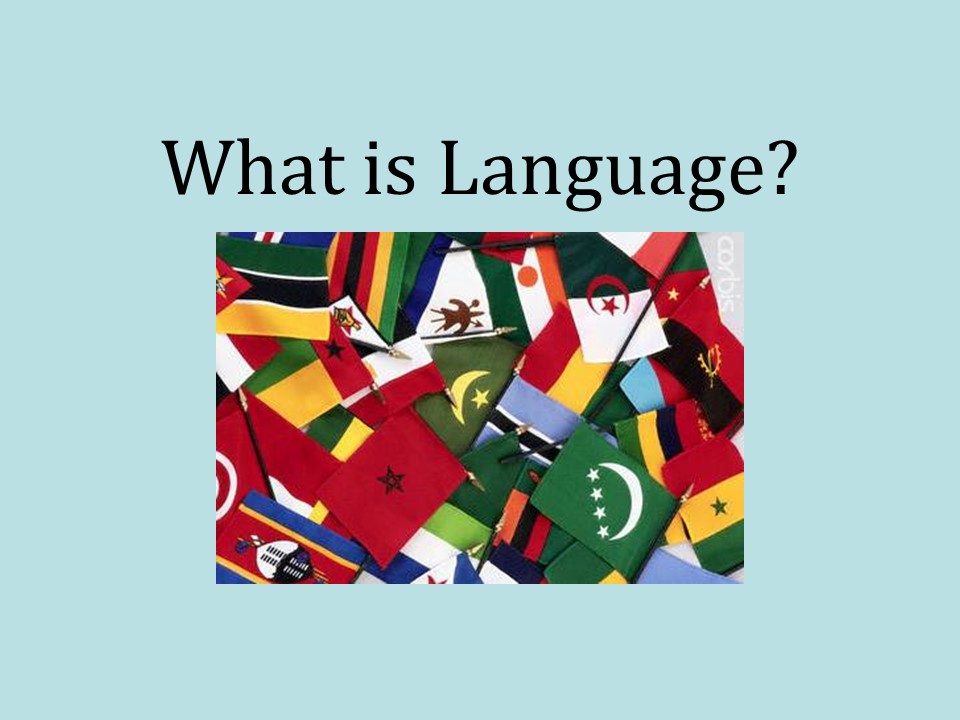What is Language? - PowerPoint PPT Presentation
1 / 16
Title:
What is Language?
Description:
What is Language? H la! Qu tal? Guten Tag. Wie geht s? Ciao. Come va? Salut! a va? Konnichi wa. Language according to Webster s dictionary is a system or ... – PowerPoint PPT presentation
Number of Views:140
Avg rating:3.0/5.0
Title: What is Language?
1
What is Language?
2
Guten Tag. Wie gehts?
Ciao. Come va?
Salut! a va?
Konnichi wa.
Hóla! Qué tal?
3
Language according to Websters dictionary is a
system or means of communication. Communication
is the way in which humans exchange or transfer
of information, ideas or emotions. It is humans
ability to communicate with each other that
separates us from animals.
4
There are 2 main types of language.
SPOKEN
WRITTEN
5
Written language can be either composed of
pictographs or alphabets.
A pictograph is a symbol or drawing that
represents a specific object.
Many languages like English use letters of an
alphabet for their written language. An alphabet
is a series of symbols.
6
Other types of communication
Gestures
Sounds
Symbols
7
Every person in the world has a language but the
language that they use may be different.
8
No one knows exactly how or when humans first
began to use language. Linguists (scientists who
study languages) have been able to study almost
all of the worlds languages.
9
All languages in the world belong to a family or
a group. English belongs to the Indo-European
family. This family includes the languages
spoken by more than 1/2 of the worlds
population.
10
The Indo- European language family is divided
into sub-groups. These are some examples of the
larger sub-groups.
Slavic
Russian
Ukranian
Polish
Czech
Slovak
Serbo-Croatian
Bulgarian
Germanic
German
Dutch
Swedish
Danish
Norwegian
Icelandic
English
Romance
Latin
Italian
Spanish
Portuguese
French
Rumanian
11
All languages are made up of words. A word is a
thing that conveys a meaning. In other words, a
word stands for something.
BOOK
Liber (Latin)
Das Buch (German)
Hon (Japanese)
El libro (Spanish)
Kitabu (Swahili)
Shu (Chinese)
12
Languages often borrow, adapt and create new
words either from within their own language . .
German English
Geburt Birth
Tag Day
Geburtstag Birthday
Geschenk Present
Geburtstagsgeschenk Birthday present
Stadt Town, city
Haupt Principal
Hauptstadt Capital (principal city)
13
. .or from a different language. Words that are
borrowed from other languages are called
cognates. Here are some examples of English words
borrowed from other languages.
Adobe (Spanish)
Rodeo (Spanish)
Prima donna (Italian)
Stucco (Italian)
Á la carte (French)
Resume (French)
Dachshund (German)
Kindergarten (German)
Tundra (Russian)
14
Besides words, all languages also have structure.
The structure of a language is also called
grammar. Grammar is the way in which words are
put together to form phrases or sentences.
Grammar or structure can vary greatly from one
language to another but languages that belong to
the same family usually have some similarities.
English Johns book
French Le livre de Jean
Spanish El libro de Juan
German Das Buch von Johann
Japanese Hanada-san no hon
Italian Il libro di Giovanni
Latin Liber Ioanni
15
Spanish, like English, has nouns, verbs and
adjectives.
Noun
A person, place or thing
Verb
An action word
Adjective
A word that describes a noun
16
The tall girl ran to class.
Girl is the noun.
Ran is the verb.
Tall is the adjective.
La muchacha alta corrIó a la clase.
La muchacha is the noun.
Corrió is the verb.
Alta is the adjective.































